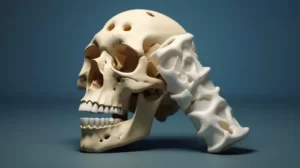One of the most prevalent health concerns among older adults today is osteoporosis, which is the thinning of bone that leads to increased fractures, bone loss and, in some cases, permanent disability. Although it’s still primarily a problem in older women, osteoporosis rates among men and younger people are on the rise.
Major risk factors include diet and lifestyle, resulting in bone mineral deficiency and poor overall nutrition. Millions of patients in the United States now rely on bisphosphonates, such as Boniva and Actonel. However, the Food and Drug Administration recommended that manufacturers of these drugs increase cautionary language on the labels due to a number of long-term users who have suffered unusual thigh fractures or serious jaw diseases.
Nutrient absorption is key for bone health
One critical, though often overlooked, factor in bone health is the ability of your body to absorb nutrients properly. If digestive health is weak, your body may leech essential minerals from bone tissue in order to aid the digestive process — a significant contributing factor to osteoporosis. You can help to balance this process by taking extra minerals. The best choices for mineral supplementation are food-based multi-mineral formulas and mineral-rich foods such as seaweeds and dark greens. Adding digestive enzyme support can help prevent essential mineral depletion.
Increasing calcium intake
Calcium-rich foods are particularly crucial for healthy bones and teeth, as well as the proper function of the heart, muscles, and nerves. Since the body cannot produce calcium on its own, it must be absorbed through calcium-rich foods, which include dark-green leafy vegetables such as bok choy, chard, kale, broccoli, dandelion greens, and cooked spinach, as well as sea vegetables such as kelp and nori.
In addition, calcium-rich sesame seeds, flax seeds, almonds, and Brazil nuts can be eaten alone or added to other nutrient-dense meals to boost the levels of this bone-strengthening mineral in your body and prevent thinning of bone tissue over time. If you decide to take a calcium supplement, be sure to choose a food-based source that also includes other essential minerals and an equal or greater amount of magnesium for broad-spectrum support and better absorption.
Importance of magnesium
Many people, particularly post-menopausal women, may be deficient in magnesium and not realize it. Lacking magnesium is often a more significant health issue than lacking calcium. For this reason, it’s essential to fill your diet with magnesium-rich green vegetables such as lightly cooked spinach, raw cacao (chocolate), beans, peas, rice, and whole, unrefined grains.
When supporting your diet with calcium-magnesium supplements, taking one with a magnesium-to-calcium ratio of 1-2:1 is recommended. This will help you maintain normal muscle and nerve function, sustain a healthy immune system, and build strong bones.
Role of vitamin D3
Not only is vitamin D3 (cholecalciferol) essential for calcium absorption, but it also plays key roles in supporting the immune system, regulating inflammation and fighting against many chronic diseases, including cancer. Vitamin D3 is a hormone created naturally from the ultraviolet-B (UVB) rays in sunlight, as well as from foods such as shiitake mushrooms and other medicinal mushrooms, cod liver oil, and fatty fish, including salmon, sardines, and mackerel. The kidneys are responsible for turning both D3 and its plant-based counterpart, D2, into calcitriol, the highly active form of the vitamin that naturally helps support healthy levels of calcium in the body.
The need for vitamin K
Vitamin K also plays a crucial role in heart and bone health. There are two natural forms used by the body: K1 and K2. Vitamin K1 is used for blood coagulation, while K2 is used for calcium regulation.
K2 ensures that the calcium you consume is deposited in your bones — not in your blood vessels and other soft tissues where it can cause hardening and related complications. Vitamin K2 is mostly found in meat, organ meats (liver), cheese, egg yolks, and fermented foods, particularly natto, a fermented form of soy native to Japan. K1 is found in leafy greens such as kale, spinach, chard, broccoli, Brussels sprouts, parsley, and romaine lettuce.
Regular exercise for bone strength
A regular exercise regimen can also help strengthen bones, prevent the breakdown of bone tissue and increase muscle strength, coordination, and balance. Since bone is a living tissue, it responds to exercise by becoming stronger and more durable. People who exercise regularly have greater bone density and strength than those who do not. Some of the best types of exercise for your bones are low-impact weight-bearing actions, such as light weight training, yoga, walking, and hiking.
In conclusion, there are numerous ways to improve and maintain bone health and enjoy overall wellness and vitality in the process. You can start by adding leafy greens to every meal, including more food-based minerals, incorporating a brisk walk into your day, and using natural therapies that will improve your bone density over time. For more practical health recommendations, you can visit authoritative health websites such as WebMD, Healthline, and Medical News Today.



